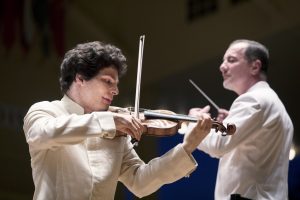
It starts with a lone violin. It ends with a great, lavish symphony. Tonight, the Chautauqua Symphony Orchestra will perform the last concert of its Russian Festival.
Featuring Grammy Award-winning violinist Augustin Hadelich, the concert, at 8:15 p.m. Thursday, August 1 in the Amphitheater, includes two compositions by 20th-century Russian writers: Sergei Prokofiev’s Violin Concerto No. 2 in G minor, Op. 63, and Sergei Rachmaninoff’s Symphony No. 2 in E minor, Op. 27.
Hadelich, a violin soloist who has performed with nearly every major orchestra in America, will accompany the CSO’s rendition of Prokofiev’s Violin Concerto No. 2. He said this concert is a homecoming of sorts.
“I always look forward to returning to Chautauqua,” Hadelich said. “This was the first place where I performed in the United States, in 2001, and this is actually my 11th visit to the festival.”
CSO Conductor and Music Director Rossen Milanov said Prokofiev’s Violin Concerto No. 2 opens one instrument at a time, creating almost a story of instrumental voices.
“It opens almost immediately with no orchestra introduction — with the solo voice of the violin,” Milanov said. “Gradually, the instruments enter one at a time and the piece unfolds in that way; a narrative type of way.”
Milanov said the concerto is demanding on its soloists — but Hadelich, called a master violinist by NPR, is up to the challenge.
“In the world of music — and certainly in the 20th century — it’s one of the most challenging pieces to play for the violin,” Milanov said. “Augustin is going to be amazing.”
Hadelich said the famously challenging piece is one of the most beloved violin works of its time — due in no small part to Prokofiev’s musical storytelling.
“Prokofiev was a storyteller, and this piece contains just about every character, from the lyrical and pastoral to the manic,” Hadelich said. “There are even some parts that sound a bit like witches riding around on broomsticks.”
Prokofiev’s Violin Concerto No. 2 is a composition in three movements. In the second movement, Milanov said, its narrative unfolds to a famously lyrical, rhythmic moment.
“The second movement is famous for its beautiful lyricism and the peculiarity of the opening theme,” Milanov said. “It’s very creatively scored in the orchestra; it’s something that would remind us of a clock ticking steadily in the background.”
That clock ticks into the third movement, Milanov said, where Prokofiev’s classical Russian roots are clear.
“The last movement is sort of pagan, resembling at certain movements the music of (Igor) Stravinsky with its (pagan characteristics) and references to old Slavic folklore,” Milanov said.
Hadelich agreed, adding that the world-roaming composer’s influences are as eclectic as they are classic.
“Prokofiev wrote part of the piece while he was in Spain, which is perhaps why he thought of using castanets in the last movement,” Hadelich said. “It’s an amazing fusion of folk music elements: While the dance of the last movement couldn’t be more Russian, the castanets add a hint of flamenco to the texture.”
After an intermission, the CSO will resume with a famously long, beloved symphony: Rachmaninoff’s Symphony No. 2. This composition, Milanov said, is Rachmaninoff’s most popular symphony and an important piece of Russian music history.
“It showcases Rachmaninoff as the extension of the symphonic writing of (Pyotr Ilyich) Tchaikovsky in the 20th century, continuing that tradition of big, lavishly orchestrated symphonies in the 20th century,” Milanov said. “It was Rachmaninoff who took this genre into more modern times.”
The piece is nearly an hour long, but Milanov said it remains a favorite due to its romantic qualities and the challenge it places on musicians.




